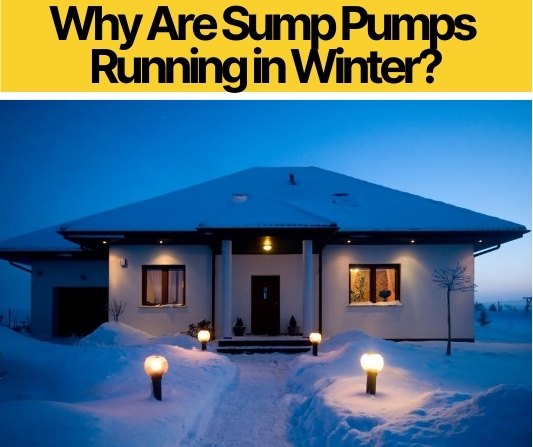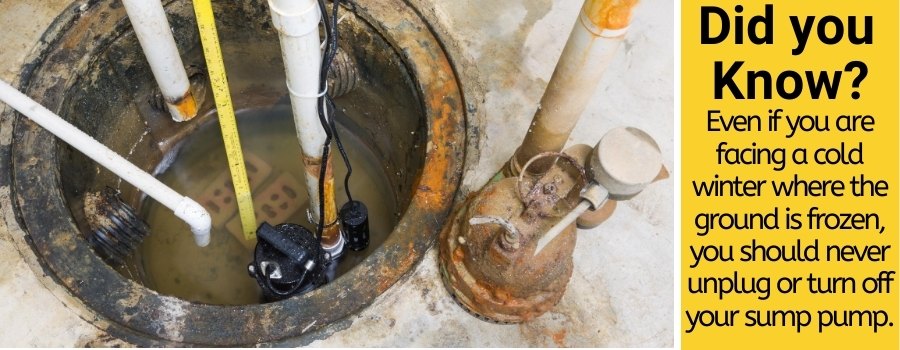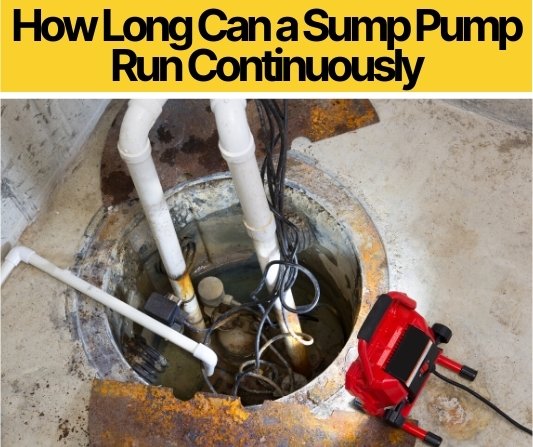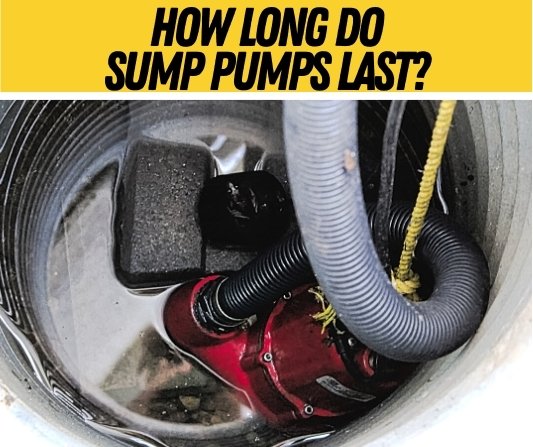 As the seasons change and you edge into Winter, many think that their sump pump will be in hibernation until the thawing in early Spring. It is normal to associate Winter with an end to the need for your sump pump to be pumping.
As the seasons change and you edge into Winter, many think that their sump pump will be in hibernation until the thawing in early Spring. It is normal to associate Winter with an end to the need for your sump pump to be pumping.
However, it’s not unusual for the pump to be occasionally operating throughout Winter. It is also equally susceptible to damage from the Winter conditions.
Let’s have a look at why your pump is working in the winter and ways to keep the sump pump in fighting fit condition to get ready for Spring.
Why is my sump pump running in Winter?
Normally, your sump pump should be doing a lot less work in the Winter (this differs on where you are living). But due to the cold weather and freezing of the ground there’s less need for your pump to be extracting water, as there is just literally less water to work with.
Your pump can easily be called into action in the Winter and there would be nothing to worry about. If functioning properly, it is completely normal to expect it to be pumping if there’s a rise in temperature or excessive rain. This would bring about higher levels in the water table or just generally leaking into the basement. However, if there has been an extended period of cold weather or snow and ice, your pump should be much less active. Sometimes, your pump may be working a lot during a period of extreme coldness. It is in this case that you may be looking at a malfunction in your pump.
We are going to have a look at why your sump pump is running in winter? If so, is there anything wrong with the machine? What is the general maintenance required of sump pumps in Winter? Let’s get to the bottom of any issues surrounding sump pumps and any reasons as to why they might be broken, malfunctioning or just acting out!

Sump pump constantly running in Winter
Winter is no exception in the sump pump world. If your pump is constantly running for days and days on end then there is something wrong with it. Sump pumps can work up to 22+ hours when required, but this should be more than enough time for it to get all of the water out of the basement. If your pump is working longer than this or consistently over a few days then it’s probably facing a malfunction. With regard to Winter specifically, the pump should be working less than Spring and Fall.
Due to the drop in temperature and the freezing of the land there is less moisture in the ground. This means there’s less chance your pump is going to be needed. This does not, however, mean that the pump is not going to be utilizing itself. But, and this is a big but, if your pump is actively and consistently working in the Winter then you are more than likely facing a problem with your pump.
Read More: How Long Can a Sump Pump Run Continuously (Before burning out)
How much is too much?
There is obviously no set limit to how much your pump should and shouldn’t be functioning. But this is within reason. Your pump is going to be working less in dry or freezing conditions, with less active water in the ground. Alternatively, your pump should be working effectively enough that it is not pumping constantly for days on end. The weather really does influence your pump activity.
As a rough marker, during rainy periods your pump can be working normally anywhere from 6-22+ hours a day.It should only really be working this hard during really stormy and rainy weather. On the flip side, if there has been extremely cold or dry conditions, your pump should only really be working for minutes a day at a time, if at all. Anything over 6 hours for days and days on end is something to be investigating. Irregularity and constant working is a classic reflection of your pump being broken.
Also Read: How long Can Sump Pumps Last
Causes of malfunction
One of the main causes of malfunction in Winter is going to be your sump pumps discharge pipe (or commonly known as the Flex Hose) being frozen over or clogged. If this hose is clogged or frozen, the water which the pump should be sucking up and discharging outside of the house away from the foundations of the house is not being shifted. This causes a serious backlog which can not only cause pump damage but can, in turn, cause flooding or dampness in the basement as the pump cannot do its actual job.
Another cause of malfunction that is common is the float switch being broken. This causes the pump to think that it is constantly needing to pump even when there is no need for the water in the basement to be pumped away. The positioning of your house can also affect the rate at which your pump is working. This can range from where on the hill you are to where your house lies with regard to the nearest water table. Due to there being a lot of different factors affecting your sump pump it’s important to know your own setup and also any ways in which you can maintain your pump issues or resolve them quicker and better to avoid any unwanted flooding in your basement.
What can you do about it?
To stop any unwanted inconveniences with your sump pump the key is to maintain the machine and get it ready for different seasons – particularly Winter. Removing the discharge pipe should be your first port of call. If you remove the pipe then you can essentially remove the problem from the get-go. This, however, only works if you know the Winter is going to be freezing and the pump is not going to be used. If you don’t want to remove the pipe, you might be better getting yourself a second pipe to attach if the first one does encounter any issues. Testing your pump regularly is necessary regardless, but perhaps throughout winter you would benefit from it more as there is more chance of it going wrong.
To stop any freezing in the basement, keeping the heat in your house on is important as it will send retained heat into the basement and protect both the sump pump and other objects down there from being damaged by the cold elements. If you are removing the discharge pipe then ALWAYS remember to install it back on again for Spring time to avoid any Spring floodings in your basement. It is also important to never turn your sump pump off, this can cause serious flooding because many forget to turn it back on come Spring, before it is too late!
Should my sump pump run in Winter?
This depends on what climate you live in. In cooler areas that see freezing temperatures throughout their Winter, you can expect your sump pump to not be working too hard. However, if you are more Southerly with a wetter Winter climate you will be looking at getting more use out of your sump pump come the Winter months. Regardless the pump should not be working flat out, but equally should not completely stop running.
What do you do with a Sump Pump in Winter?
Normal maintenance is key for your sump pump throughout Winter. But it is also important to monitor the Flex Hose to avoid any unwanted malfunctions due to freezing. They are prone to freezing. To avoid this you can remove the hose altogether and reinstall it in Spring. You can also have a look at having a second backup hose. If you are living in a rainy Winter season area you will face more rain than you would for the rest of the year. This just means your pump should be working normally, perhaps a tad over time, but should not be running constantly. It should be running anywhere from 6-22 hours a day provided it is heavy rain.
If the pump is running more than this it will probably have something wrong with it. When it is continuously clicking water through despite there being a lack of any distinct rainfall, the pump is commonly facing a float switch issue. This is the switch which tells the machine the water level and consequently tells the pump to remove the excess water. This can tend to be either set too high or else can be a broken switch can cause all sorts of problems. Whatever you do, don’t turn off the sump pump during the Winter months.
Should you unplug and turn off your sump pump during Winter?
Even if you are facing a cold winter where the ground is frozen, you should never unplug or turn off your sump pump. Water can always make it into your basement, whether that be from unfrozen water below the surface or melting from temporary higher temperatures which tends to happen once or twice in a normal Winter. If you turn it off or unplug your pump there will be serious repercussions. Without the pump functioning regularly, you will face the chance of serious flooding in your basement.
Sump Pump Winter Care
Freezing and general maintenance are two of the big hitters to your sump pump during Winter. Many underestimate how important both of these factors are to the survival of your sump pump. Keeping the pump from freezing should be your main priority and general maintenance should come after this. If you live in warmer temperatures your Winter pump care should follow the same as the rest of the year. Any over pumping can cause overheating or burning out of the pump.
Protecting your Sump Pump in Winter
There are numerous ways to protect your pump in Winter. Protecting your discharge pipe is the most important thing but there’s other things you can do to protect your pump. Keep the water running in your house – this is because running water is less likely to freeze. Additionally, many recommend using heatproof tape round the discharge pipe which ultimately stops it from freezing over.
Keeping the basement warm is also useful. This means that the pump itself will avoid any freezing that may cause issues. If you are going to have colder temperatures for some time, taking out the flux pipe till the cold period is over is your best bet to avoid any damage to your pump. You also need to take care of your sump pumps motor during the cold weather. By redirecting the water pipes in your house, you alleviate the pressure put on your motor to allow increased drainage. These all are various ways to protect that sump pump of yours from excessive damage during the Winter.
Protecting your Sump Pump discharge line in Winter
The best protection is removing the hose altogether and reattaching it come Spring. But if you think you’ll need the hose or you’ll forget to reattach it in time for Spring then there are alternatives to this. Running hot water through the line is the best way to avoid any blockages or freezes in the line. This means that you will avoid the worst of any discharge line issues. You can also proactively protect your discharge line by insulating it effectively before Winter to protect it from the cold weather.
Sump Pump not working in Winter
It’s frozen. Just as it should not be running constantly, your pump should also still be running at some point during Winter as the seasons see periods of thaw. Your sump pump has a frozen area if it has not worked at all during Winter. This can be anything from the motor in the actual pump structure to the very end of the discharge line.
Causes
A basement is a cold place, which can easily lead to a motor breakdown. However, the most common issue regarding stoppages to sump pumps in Winter, as mentioned before, is the discharge line. Despite, potentially, working hard and pumping a lot of water these hoses are notorious for freezing and blockages come Winter.
Tips on How to keep your sump pump running during the Winter
You need to be removing your discharge pipe. If not removing this, you should at least purchase a backup for when it inevitably freezes over. Laying the pipe at an angle which allows the water to run down also helps, letting gravity do the work and stopping any freezes in the pipe. Whilst insulating both your basement to retain some heat for the pump or else insulating the discharge line/flex hose should prevent both from freezing over.
You can also experiment with changing the direction of the water flow. This means the pump doesn’t end up getting overwhelmed or overworked and the water is less likely to freeze in the lines. This means redirecting water in the foundations away from the sump pump or alternatively, many run hot water through their pump to allow the pipe to remain clear and unblocked from ice. Keeping the pumps clear is going to be your main priority during the cold winter months.






